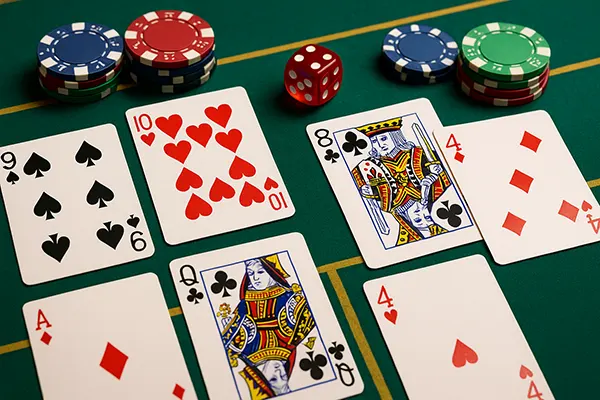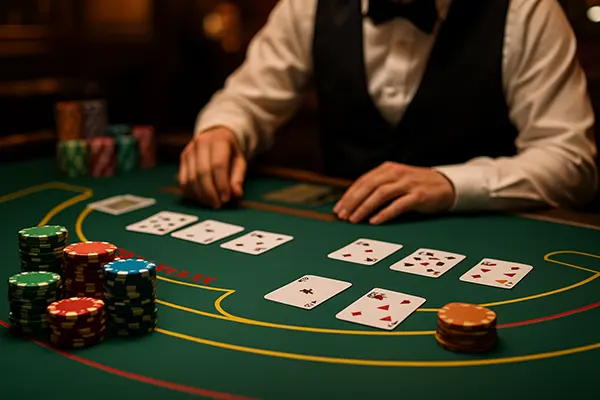
Blackjack vs. Baccarat: A Comparative Analysis of Odds, Strategies and Payouts
Choosing between blackjack and baccarat can be challenging, especially for players aiming to maximise their potential returns while keeping gameplay engaging. Both card games have stood the test of time, offering distinct rules, strategic approaches, and expected returns. This article breaks down the essential differences between blackjack and baccarat, focusing on their odds, strategic complexity, and typical payouts, helping you make an informed choice.
Understanding the Odds: Which Game Offers Better Returns?
Blackjack is often praised for its low house edge, especially when players apply basic strategy. Under standard rules, the house edge in blackjack can be as low as 0.5%, depending on factors such as deck count and dealer behaviour. This makes it one of the most favourable games for skilled players who make mathematically sound decisions.
Baccarat, in contrast, offers straightforward betting options with a slightly higher but still competitive house edge. Bets on the banker have a house edge of around 1.06%, while player bets come in at approximately 1.24%. Although slightly less favourable than blackjack, baccarat still ranks among the top games in terms of player odds.
One key difference is that blackjack requires active decision-making, affecting the outcome. In baccarat, outcomes depend largely on fixed drawing rules, and player decisions are limited to the initial bet, making the odds more consistent but less influenced by player skill.
Statistical Comparison of House Edge
The house edge in blackjack is variable but can be reduced significantly with optimal play. For example, multi-deck blackjack with liberal rules can reduce the house edge to 0.3%. In contrast, single-deck variants may offer better odds but include rule adjustments that raise the edge.
Baccarat remains more stable across most variations. Banker bets are statistically the best choice, although many casinos charge a 5% commission on winning banker bets, which slightly affects long-term profitability.
Ultimately, blackjack favours players willing to learn strategies, while baccarat offers a simpler betting experience with fixed probabilities, making it more suitable for casual players who prefer consistency over complexity.
Strategic Depth and Player Involvement
Blackjack’s core appeal lies in its strategic depth. Players are responsible for every decision—whether to hit, stand, double, split, or surrender—based on their cards and the dealer’s upcard. This creates a layer of control, making it attractive to those who enjoy skill-based gameplay.
Mastering basic strategy in blackjack can significantly improve results, and card counting (where allowed) provides an additional edge. Though not foolproof, these techniques give informed players a measurable advantage over time, especially in land-based settings.
In contrast, baccarat’s strategy is minimal. Players choose one of three bets—banker, player, or tie—and then the game proceeds automatically. There are no decisions after betting, and the outcome is determined by pre-set rules. This simplicity makes baccarat ideal for those looking for a relaxed experience without the pressure of decision-making.
Skill vs Simplicity
The skill ceiling in blackjack is much higher. Advanced players can memorise charts, practise simulations, and refine their decisions based on probability tables. This makes blackjack particularly popular among mathematically inclined players and professionals.
Baccarat, on the other hand, appeals through its minimal cognitive load. It’s a game of pure luck with a touch of probability awareness, primarily in avoiding tie bets due to their high house edge (usually over 14%).
While blackjack rewards dedication and study, baccarat offers a quick entry point and consistent pace, favouring those who prioritise ease and elegance over active engagement.

Payout Structures and Long-Term Expectations
Payouts in blackjack are relatively generous if favourable rules are in place. A standard blackjack pays 3:2, meaning a £10 bet returns £15 for a natural. However, some venues have reduced this to 6:5, which negatively impacts long-term profits and raises the effective house edge.
Standard blackjack wins pay 1:1, and insurance—generally advised against—pays 2:1. The possibility of doubling down or splitting can amplify returns if used wisely, contributing to higher volatility and reward potential over time.
Baccarat offers 1:1 payouts on both banker and player bets, with the banker win subject to commission. Tie bets typically pay 8:1 or 9:1, but their poor odds make them less advisable. The payout structure in baccarat is simpler but includes fewer opportunities for strategic risk-reward scenarios.
Volatility and Profitability
Blackjack’s mix of risk and reward creates moderate volatility. Players can go on winning streaks or experience swings, especially when using aggressive betting systems. Skill-based decision-making allows for better control over this volatility.
Baccarat is less volatile due to its passive nature and steady payout framework. Most players stick to banker or player bets, and bankrolls deplete more slowly over time. However, the lack of strategic leverage limits earning potential.
In terms of profitability, blackjack offers higher potential for skilled players, while baccarat provides safer, steadier returns for those content with lower variance.
Most popular
-
 Gates of Olympus
Gates of OlympusThe Gates of Olympus open up numerous possibilities for the user. And in fact, this theme in …
-
 Poker and Mental Health: Staying Focused and Avoiding Burnout
Poker and Mental Health: Staying Focused and Avoiding BurnoutCompetitive poker is often portrayed as a thrilling game of skill and intuition, but behind the scenes, …
-
 Sinbad’s Golden Voyage: A Riveting Journey Across Waves of Fo...
Sinbad’s Golden Voyage: A Riveting Journey Across Waves of Fo...As we set sail into the mesmerizing world of online slots, there are few experiences as adventurous …
